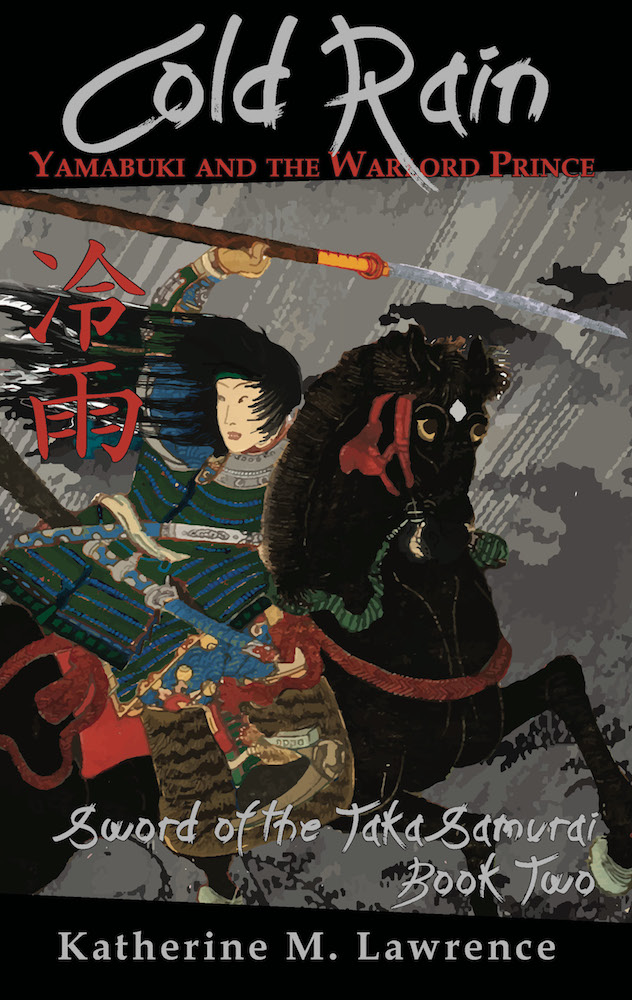I am bringing out a new Yamabuki book in the next few weeks called Cold Rain, or Reiu 冷雨 in Japanese, but you don’t have read or understand Japanese to enjoy this book. This book was created when the original Book 2 Cold Heart became too large to comfortably fit into the series, so the 6 book series is now 7. Cold Heart will still appear and pretty much on the heels of Cold Rain.
Cold Rain brings other major characters of Yamabuki’s life onto the stage as she heads toward Heain-kyo. These actors include Yamabuki’s parents, daimyo Taka and Lady Taka, herself an accomplished swordswoman; Yamabuki’s beloved handmaids Tomo-ko and Hana-ye; Yamabuki’s teacher of languages, science of the day, and martial arts, Lord Nakagawa; and Yamabuki’s “Javert,” the fallen priest turned assassin, Saburo, who has sworn to kill Yamabuki now that he learns that she has killed his mentor and master.
The boat began to broach. Saburo’s curdled stomach turned. Icy salt spray flew over the side of hull, drenching him, though he shivered more from nausea than from cold.
Tetsu battled the storm for control of his boat from the sternpost tiller. He cried orders to his crew of three: the sailman, the ropeman, and the deckman. The men sprang into action and the haul-boat slowly but steadily came about until it headed directly into the rollers that scuttled down through the Barrier Strait. As the crew moved about, Saburo lay against the hull, gripping the rail as the boat rode on into The Neck, a channel that boatmen referred to as The Dragon’s Throat: a narrow ocean slot that separated two of the Empire’s immense volcanic Isles.
Each swell gently lifted the kobune’s hull high and then slammed it down hard against the bottom of each trough, only to lift it up yet again, over and over, until Saburo’s head spun and his gorge rose. Gagging on his own spew, he got to his feet and staggered toward the bow where he bent his head over the side and unceremoniously retched into the waves. The spindrift spit into his face, stung his one exposed eye, and filled his half-open mouth with saltwater.
Saburo spat back and cursed. Yamabuki, the woman Saburo sought and was sworn to kill, had slipped past him that very morning and there was little doubt in his mind that she had made it to the opposite shore.
Tetsu barked, “Everyone! Tie in!” His words were still hanging in the air as the crew nimbly strung and secured a heavy rope-line stem to stern, and then proceeded to tie cinch-ropes around their own waists, after which they hitched the free ends via slipknots to the trunk line. The crew exchanged looks when their sole passenger, supposedly a crab fisherman, failed to likewise tie in. The captain grew wroth, shook his finger at Saburo, and bellowed, “Him too!”
The deckman immediately made his way forward. Taken by surprise, Saburo struggled. He wanted no part of any rope. Resist as he might the deckman handily pulled the cinch-rope around the flaying crabber whose footing gave way when an especially heavy wave hit. Saburo tumbled, but now cinched, the security rope smartly snapped taught. He only fell against the hull instead of toppling over the side. Managing to get to his knees, again hugging the rail, Saburo choked, “You’re not sailing to where I told you to.”
The deckman growled, “Thank the Gods that the boat’s still riding. Thank them you aren’t with some second-rate shout-men.”
The deckman turned his back, leaving the crabber to his hopeless gagging. It was best to look away. Seasickness was an infection spread as much by sight and idea as by any roll or pitch of waves.
Saburo went back to heaving his gorge over the side, but by now there was none left in him. He gasped as his gut muscles cramped themselves into knots.
The view over the side had only made his seasickness worse. One moment the waters swelled into towering mounds; the next they fell away so that he found himself peering into an ocean gulley. The only thing that did not undulate was the kobune’s wooden hull. Everything else constantly shifted shape, for such is the way of water; a changeling—no matter whether a man looks out with two good eyes, or wears an eyepatch over one.
He closed his uncovered eye to blank out the picture, yet his senses still reached out into the boat so that he felt each rhythmic lurch. Still at one with the boat, in his mind he pictured how it bobbed and yawed with every roller.
My eye is closed, but I still “see.”
He knew he needed to think on something other than the waves, otherwise the nausea would not stop.
A master assassin, Saburo succeeded in his shadowy enterprises because he was almost always was at one with his surroundings. However, now was not the time to reach outside with his senses. It was time to mute them.
He gritted his teeth.
I am here by choice.
He could not let his anger with the sea and the state of his stomach determine what was in his head.
I must master my mind.
And now began an epic battle—between himself and “the monkey.”
